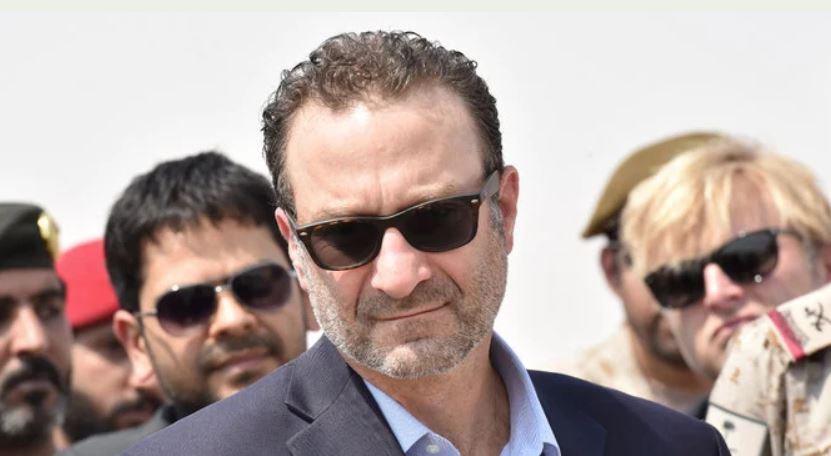NEW YORK: Hezbollah’s political allies in Lebanon will be held accountable for supporting the militant group, a senior US official said on Tuesday.
The warning, from Assistant Secretary of State for Near Eastern Affairs David Schenker, came shortly after the US Treasury blacklisted Lebanese former finance minister Ali Hassan Khalil and former transport minister Youssef Fenianos.
They are accused of providing material support for, and granting political and economic favors to, Iran-backed Hezbollah, which the US considers a terrorist organization.
“Political allies of Hezbollah should know they will be held accountable for any enabling of its terrorist and illicit activities,” Schenker said after a tour of the Middle east that included visits to Kuwait, Qatar and Lebanon,
During his two-day stop in Lebanon, he chose only to meet with opposition demonstrators, in a sign of Washington’s exasperation with the country’s political establishment.
#LISTEN: #US Assistant Secretary of State for Near Eastern Affairs David Schenker assured that #Lebanese leaders will be held accountable for failing their people https://t.co/MTBEzcodMK pic.twitter.com/u4vHXdUfsE
— Arab News (@arabnews) September 9, 2020
His visit came a month after the devastating explosion at Beirut’s port that damaged a large part of the city, at a time when people were already reeling from a prolonged political crisis, an economic meltdown and the coronavirus pandemic.
Schenker restated his country’s commitment to helping the Lebanese people recover from the Aug. 4 disaster, which killed more than 200 people.

US Assistant Secretary for Near Eastern Affairs David Schenker. (File/AFP)
He added that the US supports “their legitimate calls for economic and institutional reform, transparency, accountability and an end to the endemic corruption that has stifled Lebanon’s tremendous potential.”
Next month marks the first anniversary of public demonstrations that began when hundreds of thousands people in Lebanon took to the streets to protest against the worsening economic and social problems caused by these issues.
“The Lebanese people made clear their desire for meaningful change, and for their government and political leaders to chart a new direction dedicated to reform and the end of corruption, to help Lebanon exit this current crisis,” Schenker said.
He vowed that Washington will maintain its pressure on Hezbollah, its supporters and “other corrupt actors” for obstructing the Lebanese people’s “aspirations for economic opportunity, accountability and transparency.”
He added: “It’s time for different politics in Lebanon.”
Schenker also highlighted the difference of opinion between the US and France about Hezbollah, which Paris views as two separate entities: a political party and a military wing.
French President Emmanuel Macron met with a number of Lebanese political leaders, including Hezbollah MP Mohammad Raad, during his Beirut visit last week.
“In democracies you have to choose between bullets and ballots,” Schenker said. “You cannot have both. Political parties do not have militias.”
However, he said the US and France are on same page when it comes to political and economic reforms being a prerequisite for any unlocking of international financial assistance to Lebanon.
In the wider regional context, Schenker also reiterated Washington’s desire for the Gulf rift to be resolved. Unity among Gulf nations is an important step forward in efforts to counter “Iran’s malign influence in the region,” he said.
Saudi Arabia, the UAE, Bahrain and Egypt severed diplomatic ties with Qatar in June 2017 over Doha’s connections to Iran and its alleged support for terrorism.
#LISTEN: #US Assistant Secretary of State for Near Eastern Affairs David Schenker on whether or not sanctions against #Iran are serving their purpose https://t.co/MTBEzcodMK pic.twitter.com/NujeIheU0q
— Arab News (@arabnews) September 9, 2020
The “dispute only serves the interests of our adversaries and harms our mutual interests,” Schenker added.
He also highlighted the united front displayed by the six members of the Gulf Cooperation Council — Saudi Arabia, the UAE, Bahrain, Kuwait, Oman and Qatar — last month, when they called on the UN Security Council to extend the international arms embargo on Iran, as a powerful step that showed “the collective strength of a united Gulf that’s needed for the sake of advancing greater peace and security.”
He acknowledged that there are “long standing and deep-seated disagreements” within the GCC but said US efforts to help resolve the disputes will continue “and we are hopeful that we’ll eventually get to a solution on that.”
Schenker also said the recent Abraham Accord, the agreement between Israel and the UAE to normalize relations, has had a significant effect on his discussions with Gulf partners. He added that he hopes other countries will follow the example set by the UAE and make efforts to establish formal relations with Israel.
“The (UAE-Israel) agreement provides the foundation for advances toward regional peace, and puts the region on a truly transformative path,” he added.




























